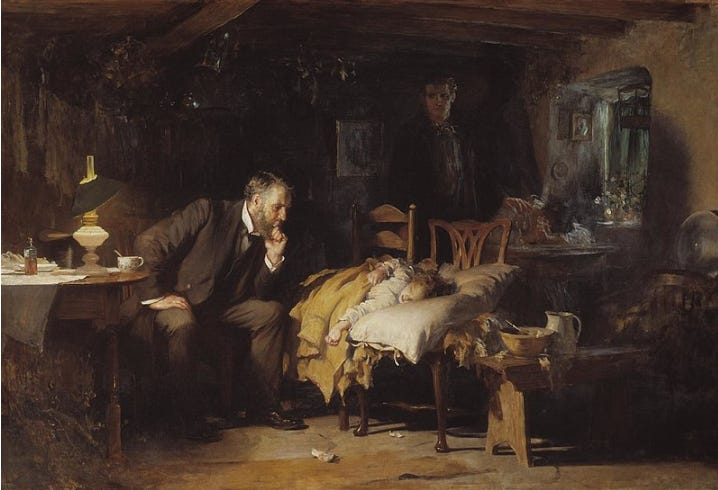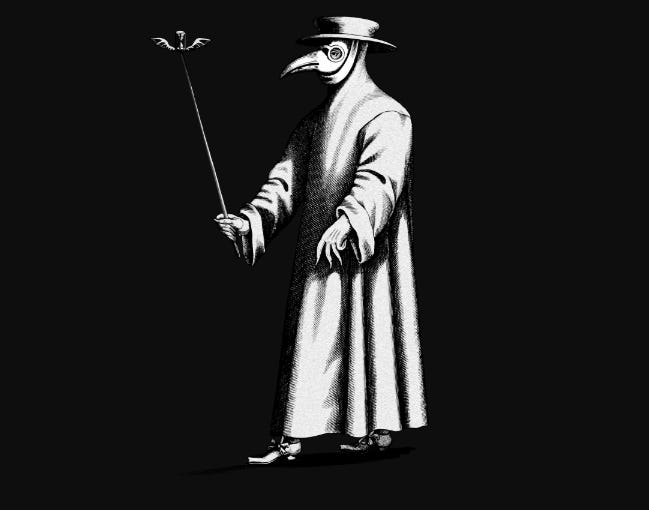Doc, I'm Burning Up
The clearest signal that climate change has very much arrived may come from your doctor.

I hope you are enjoying this hilariously non-weekly newsletter. Share and sign up, if you haven’t already. You are all heroes.
“We owe it to our children and our grandchildren to put out this oncoming conflagration,” said the well-meaning politician as his hair caught fire.
There is no doubt that at very least the rhetoric surrounding climate change has undergone a shift in the last year or so, with most non-Death Cultists agreeing it represents an existential threat to modern society, millions of species of plants and animals, and the actual shape of the landmasses of the planet. But one annoying piece of early-2000s Climate Speak has retained its popularity: the insistence that fixing the problem is for future generations.
Now, there are plenty of people who do focus on the very obvious now-ness of the problem—the entire continents catching on fire, the millions of people already displaced—or very soon to be displaced—by rising seas and eroding coast lines, and so on. But the “we owe it to our children” persists, and whether this is reflective or causative, it seems to relate to public opinion.
According to the Yale Program on Climate Change Communication, only 48 percent of Americans think global warming “is already harming people in the U.S. now or within 10 years.” Meanwhile, 67 percent think it will harm “future generations.” (Let’s not talk about the missing 33 percent here, they’re lost.)

There is one group of professionals in the U.S., though, that might serve as something of a town crier for the oncoming onslaught of effects: doctors. And nurses. And basically all medical professionals. There is an already-large and growing understanding in medicine that climate change is coming for our health, in an almost uncountable number of ways, and doctors and nurses are actually starting to sound that alarm loudly.
The Harvard Center for Climate, Health, and the Global Environment (C-CHANGE) is hosting an event later this month called the Climate Crisis and Clinical Practice Symposium (co-hosted by Harvard Medical School and Harvard Global Health Institute, along with the New England Journal of Medicine). I find this to be a sort of fascinating event because it is aimed solely at other medical professionals, and not really at the public: the goal is to educate practicing clinicians on what climate change is doing to their patients, and how to get better at managing those issues.
This is very much not the first time anyone has warned about the health effects of a warming world. Exacerbated asthma, flooding-related illnesses and pathogens, worsened air quality, unprecedented rates of heat stroke, spikes in tick-borne illnesses—that’s just to name a few, and there are likely health effects we haven’t even really thought about that will enter the mix at some point. And then there’s climate-related mental health, another can of worms that is very much already open. When I wrote about the mental health effects of Hurricane Maria on Puerto Rican youth last year, one expert told me: “I don’t think we are ready for the coming tsunami of climate mental health impacts.” Which sounds ominous.
Doctors and nurses really do need to be aware of all this, and it is beyond encouraging that this group, at least, doesn’t seem to think it’s just some vague thing coming down the pike at a Date To Be Named Later.

The Harvard event isn’t some standalone thing either. From a Wall Street Journal piece last year:
At the University of Minnesota, medical, nursing and pharmacy schools, among others, have added content or tweaked existing classes to incorporate climate-related topics. The University of Illinois College of Medicine at Urbana-Champaign added a diagnosis exercise about worsening asthma due to increased wildfires from climate change. The Mayo Clinic is starting discussions this month on how to integrate the topic into its medical school’s curriculum.
Columbia University’s Mailman School of Public Health started the Global Consortium on Climate and Health Education, which aims to educate medical professionals on climate-related health issues. It has 196 members at latest count, including medical schools, nursing schools, public health schools, and others. The American Medical Association has adopted a policy of teaching climate change issues to all medical students; the students agree, with the International Federation of Medical Students’ Associations working to integrate climate change into university curricula.
I get how you can ignore a politician. It’s easy. Joe Biden telling you that climate change is a crisis doesn’t really sell the urgency when he spent however many decades in the Senate, you know, not fixing the problem. So who would you listen to?
The reason it seems like the best bellwether so far is that doctors and nurses are not trained to think about this. They are not climate scientists. They are not energy experts, or policy advocates or anything at all that in a non-warming world would have to think that hard about the climate. But they are thinking about it, in a clear-eyed sideways rebuke to politicians who say one thing and do another. The asthma cases are here, and will get worse, and it’s time to know what to do about it.
Doctors aren’t the know-everything sages of the 1950s, but they still hold a certain degree of authority in a world beset by misinformation. If they tell you which chemotherapy is most likely to kill your cancer, you’re probably going to listen to them. They’re telling you now that it’s not your children and your children’s children you need to worry about.

random bits
I was going to write about 2019-nCoV, the novel coronavirus currently Not At All Under Control in China and with cases in around 25 countries. It has sickened almost 28,000 people, at latest count, and killed 563. China seems to have tried to sort of cover it up for a little while before tugging its collar and telling the world that it might have a teensy bit of a problem. It’s not great. But honestly, I don’t have a lot to say here. It’s a reasonably scary virus, at least at this point, though it seems less deadly than SARS and less contagious than, say, the H1N1 swine flu from 2009. I’ve written plenty on how unprepared the current White House is for an outbreak of significant magnitude. It’s bad now, it will probably get worse before it gets better, but it’s not the Black Death. I’ll leave it there for now.
Important Relaxation News:
A massive galaxy was home to an incredible frenzy of star formation in the early universe. Less than one billion years after the Big Bang, 300 billion stars were born in a newly observed galaxy which then essentially died by 1.8 billion years after the universe was formed. It was making around 1,000 solar masses every year; the Milky Way, lazy shit-ass galaxy that it is, makes only one star every year.
Please share/like/subscribe/follow me/otherwise validate my existence. Thanks for reading.

Find me:


